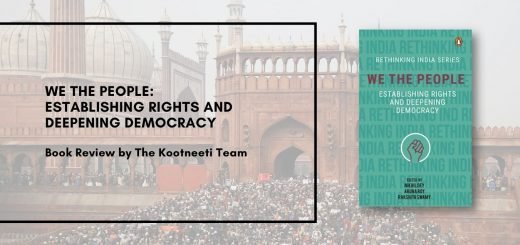Implications of United States-UAE-Israel Peace Accord on Indian Foreign Policy

India’s West Asia Policy is anticipated to get an augment following the historic agreement between Israel and UAE orchestrated by the United States as Delhi enjoys close ties with both these countries. The peace deal, named symbolically as Abraham Accord, presupposes that Israel under the leadership of Benjamin Netanyahu will suspend its annexation plans in parts of West Bank. However, the actual language used in the agreement reads that “Israel will suspend declaring sovereignty over areas outlined in President’s [Trump Peace Plan] Vision of Peace”. According to the reports, diplomatic ties between Israel -UAE one of the key players in the Arab world make India’s outreach in the region smoother and enjoy goodwill on both sides. In the last few years, India’s strategic partnership with Israel has enraged and ties with Abu Dhabi has been manifold. In fact, India is among few countries to maintain equal strong ties with all the parties Arab and Israelis Israelis and Iranians and the Gulf state. New Delhi that has championed a two-state solution will be satisfied that the deal will prevent further annexation of Palestinian territory, according to sources familiar with the region.

While the peace accord is globally applauded, it is definitely good news for India as it shares cordial relations with all the partners in the deal. However, following Gandhian Principles, India is generally not an adherent of reactive diplomacy. In the present context, this has come out very clearly! India’s non-despotic and non-interventionist policy in the Middle East has always been acknowledged in the region across the ambit.
Given the transmuted dynamics and if India believed in reactive diplomacy it would have unconditionally seized the opportunity to celebrate the peace accord. However, it took more than 22 hours for Ministry of External Affairs in India to release an official yet diplomatic statement on the peace deal congratulating the two countries for their endeavour to bring peace, stability and development in the region.
The statement released by the Official Spokesperson during a virtual weekly media briefing added that “India continues its traditional support for the Palestinian cause. We hope to see an early resumption of direct negotiations to find an acceptable two-state solution”.By taking its time, India has yet again shown the mark of a mature nation that does not take impulsive decisions.
However, this is also the time when India should not miss the bus given that it has excellent cordial relations with the trio – the US, Israel and the UAE. The two friends coming together will increase India’s diplomatic leverage in the region. The mantra for India will be to actively join the bandwagon as already Bahrain and Oman are next in line to formalising their relations with Israel. Missing this opportunity will cost India heavily. Exchange of pleasantries and congratulatory messages are taken seriously in foreign affairs and India should not shy away from doing so publicly. Even though, it is obvious that Prime Minister Narendra Modi must have called the leaders of the two countries congratulating them on the historic agreement. Nevertheless, provocation from the normal, it missed media attention which is suggestive that it was kept low key! Full normalisation of diplomatic relations between Israel and UAE, as per the statement released jointly by the three countries, necessitates the presumptive signing of bilateral agreements in three weeks regarding investment, tourism, direct flights to and fro, security cooperation and establishment of reciprocal embassies. Notwithstanding normalisation, UAE has signalled already that it will not open its embassy in the disputed Jerusalem until Palestine-Israel agreement is reached. This suggests that the Emirati embassy will open in Tel Aviv where all the other embassies are located.

In International Relations optics matters a lot! And what is its game plan is yet to be seen.
India is among the few countries that have been able to maintain equal strong ties with all parties Arabs and Israelis; Israelis and Iranians; Iranians and the Gulf states. Hallmark of Indian policy has been a balanced approach which saw India taking no sides in some of the protracted issues in the region.
The recognition grants a rare diplomatic win to India ahead as there will be an end to the war in Afghanistan. India has consistently supported peace, development and stability in West Asia, which is its extended neighbourhood. In that context, we welcome the full normalisation of ties between UAE and Israel. Both nations are key strategic partners for India.
India continues its traditional support for the Palestinian cause and hoped to see the beginning of direct negotiations between Israel and Palestine for an acceptable two-state solution.”India continues its traditional support for the Palestinian cause. We hope to see an early resumption of direct negotiations to find an acceptable two-state solution
India has an abiding commitment to the full realization of the legitimate rights of the Palestinian people, including the right to self-determination. Peace and stability in the Middle East region is also India’s key priority. India’s approach will be guided by our evaluation of how Palestinians’ rights and aspirations are upheld and how regional peace, security and stability are preserved.
India also hopes that this agreement will contribute to regional peace and to the resumption of negotiations between Israel and Palestine, with a view to the establishment of two states living in peace and security, based on international parameters to achieve a fair, lasting and mutually acceptable solution for the parties
India’s interests in the UAE and Israel are intimately linked with its regional stability, Security Angle and energy security.
Regional Instability
The GCC countries themselves are relatively stable; the Arab Spring that swept governments out of power in Tunisia, Egypt and Libya did affect the GCC countries, but the ruling families managed to maintain stability. However, Syria and Yemen are embroiled in bloody and protracted civil wars. The instability in these countries has created a tragic humanitarian crisis. The Islamic State, operating in parts of Iraq and Syria, is casting an evil shadow over the region and beyond. Whilst these seemingly untraceable issues act as a dampener in India’s West Asia policy, the pragmatic and moderate leadership of the UAE, which has made the country the fastest growing economy in the Arab world, has drawn admiration and managed to capture Modi’s interest.
As reflective in India’s official statement, the coming together of both the countries and diplomatic engagements in the region will certainly bring in peace, stability and tranquillity in the region. UAE has emitted its leadership skills at various occasions when it became the torchbearers for the Arab countries. It was not only the first country in the region to favour India’s abrogation of Article 370 on Kashmir but also promised to invest in the newly carved state of Kashmir. With its modern developmental approach and Vision, its collaboration with tech-savvy Israel will give way to major collaborative development projects in the Middle East. India should seize the opportunity to increase its diplomatic clout in the region without neglecting Iran.

The Security Angle
Another important objective is the continuing fight against terrorism and allied criminal activities like money laundering. Both aspects found mention in the joint statement, which denounces and opposes terrorism in all forms and manifestations. It calls all states to reject and abandon the use of terrorism against other countries, no matter where and by whom it is committed, dismantle terrorism infrastructure where it exists, and bring perpetrators of terrorism to justice. In his speech, Modi emphasized this point, making the same oblique reference to Pakistan without explicit mention. In this respect, the announcement that bilateral relations with the UAE would be upgraded to a comprehensive strategic partnership is a major strategic move. The joint statement also lays out numerous platforms for cooperation in countering radicalism, misuse of religion to incite hatred, and perpetuating and justifying terrorism for political motives. For the first time, bilateral cooperation will extend to counter-terrorism operations, intelligence sharing and capacity building.
Enhanced bilateral exchanges and recent security cooperation with respect to the deportation of suspected ISIS sympathizers demonstrate the shift in India’s approach towards the region as well as the region’s willingness to engage with India.
This initiative comes after Modi’s “neighbourhood first” policy, engagement with big powers, Central Asian nations, and “Act East” policy. India’s relations with the countries of West Asia can be understood as a triangle, with Iran, Israel, and the GCC countries forming the three angles. India enjoys good relations with all of them and has built considerable stakes in these countries. This outreach to Arab Muslim countries will not go unnoticed within India and in the broader South Asia region. The UAE and Israel peace plan seem to be a comprehensive plan of re-engagement with the region, which sees strained relations between the three angles of the triangle.
Given the economic and human security interests, the stability and security of the GCC countries is crucial for India. In an interview with the Khaleej Times before the visit, Modi described the UAE as a “mini India,” a theme he picked up again in his rousing speech to Indian citizens and others in Dubai. Clearly, one priority for India is the investment from countries like the UAE, which have substantial sovereign wealth funds. This was highlighted in the joint statement, with the announcement of an investment fund worth billions of dollars, for infrastructure development in India.

Energy and Economic Security
India’s energy and economic security is intimately intertwined with the GCC countries. It is, therefore, logical that in the security domain, India steps up cooperation with the UAE and Israel. This is a new and significant initiative as the United States, the primary security provider to the GCC countries disengages from the region or reduces its profile. The U.S. is moving towards self-sufficiency in oil and gas, which is unshackling its energy security from sources in the region. For India, its future energy security will remain intimately tied with energy suppliers in the Middle East at least for the next 30 years. Hence, protecting energy supplies will remain one of the highest foreign policy priorities for India. The Indian Navy’s role in anti-piracy operations to protect sea lines of communication (SLOC) is already well acknowledged. Greater security and defence cooperation with the UAE will thus enhance India’s security role in the region. As India and the U.S. also bolster their security and defence ties, synergies are emerging that can only be seen as a build-up to a robust partnership between India and the GCC.
The GCC and other countries also accept that India’s relations with Iran and Israel will follow independent trajectories, not necessarily, impeding or impinging on India’s relations with them. Modi’s visit has opened doors for closer engagement with this region, at a time of significant global geostrategic shifts.
Conclusion
The peace accord will definitely boost India’s West Asia Policy. The implications which India will have with this comprehensive peace plan can be observed from the security angle, regional stability and economic and energy security perspective.


















